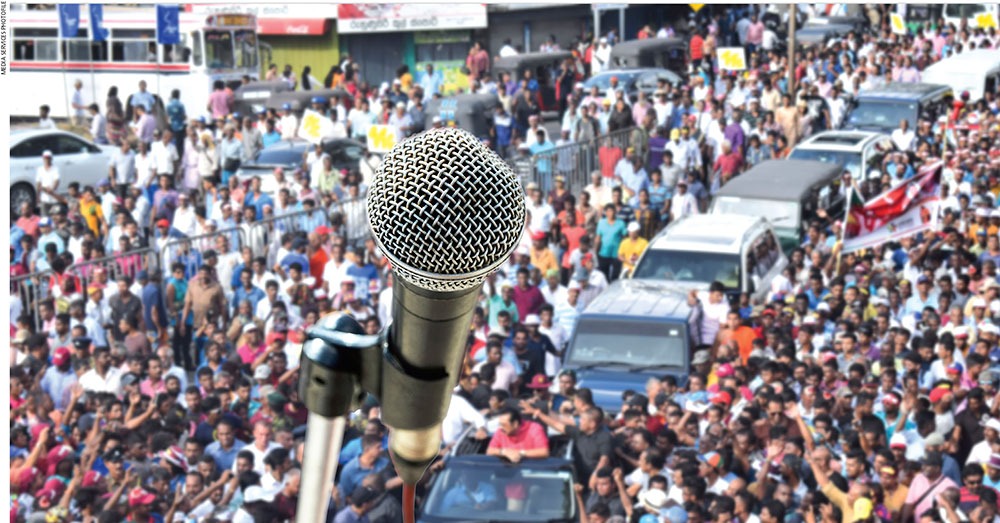STATE OF THE NATION
A fortified national unity, which the National People’s Power (NPP) government has the potential to actualise in the country’s best interests (politics apart), has no survival value in purely economic terms. Instead, it is what gives our economic survival value.

VIEWPOINTS
THE ENGINE OF ENNUI IS MOTORING ALONG!
Wijith DeChickera urges the vehicle that should take the country along a sustainable path to sociopolitical and economic reforms not to idle

That is what the NPP seems to be settling down to do – i.e. going into survival mode – instead of expediting some of the promises in its election winning manifesto.
It has not yet capitalised on the electoral goodwill extended to the Janatha Vimukthi Peramuna (JVP) led progressives to fast track the process of abolishing the executive presidency.
The JVP, having been proscribed by successive political establishments in the past, only recently convinced a polity disgruntled with crony capitalism and systemic corruption to provide it with a mandate to govern.
The discourse about eliminating the excesses of an office (that has swung like a pendulum between being odious and oddly effective in operationalising the paternalistic state) is perhaps not a priority compared to economic survival.
But it is incumbent on those who suffered under its jackboot to jump-start the draughting process constitutionally speaking, and be seen to be doing so – if only to safeguard its present ethos and future credibility.
Hornswoggling with the timeworn excuse that the executive presidency is still required to steady the ship of state in the face of strong headwinds in the geopolitical domain will not cut it with a savvier electorate.
Sundry administrations since 1978 – and despite the depredations of 1983-1989 and 2005-2015, plus the political fiascos of power sharing in 2001-2004 and 2015-2019 – may have got away with it. But civil society can scare forebear to avail itself of the cardinal opportunity now to keep up the pressure on the apposite ministries and government in general.
Surely, the authoritarian – yet, strangely incompetent – strongman governments of the past, virtually since independence and especially from 2019 to 2022, and the subversion of the rule of law and order through ‘government by gazette’, cannot be forgotten by a long-suffering citizenry?
Nor can or must the free media pander to partisan agendas by failing to remind even a government that has done a great deal of good to date in translating the benefit of regime change into the boon of system change that there is no free pass on its promises.
Perhaps in its weaker all too human moments – people having feet of clay, despite what their propagandists may say to the contrary – the NPP may wish us to be stricken with temporary amnesia.
Far be it from us to be unduly alarmist. But electorates willing to abdicate their responsibility to keep their elected governments on the straight and narrow through the democratic, constitutional and legal means available to them have seen the national interest laid low too many times before.
And lest sociopolitical bankruptcy be added to the balance sheet already replete with moral turpitude of regimes past and fiscal ruin in recent times, now is the time – as the government of the day enters its second year in neutral gear – to apply the brakes on some slippages.
Before the inertia gives the regime a wrong impetus to stay its lacklustre course as regards far-reaching systemic changes that could be affected by a new social contract.
The contention that the NPP motored along on the previous administration’s fiscal policies may be a misconception more than a canard – after all, the IMF had its strictures on Sri Lanka no matter which party or movement of any particular ideological persuasion tried to deviate from the straight and narrow from the terms of a bailout or Extended Fund Facility (EFF), the third tranche of which would be crucial for recovery momentum to be maintained.
And no matter how rhetoricians on any side of the politico-economic divide may spin the salutary economic progress made to date, the bottom line that is becoming increasingly obvious as time goes by – at least to those with their heads not buried in the sands of small successes at civics and governance – is that the country cannot afford to coast along on performing well fiscally until it hits the brick wall of 2028.
That is when Sri Lanka will have to stand on its own two feet vis-à-vis the world of international finance. Or fall on its sword again.
Asking the powers that be to prioritise both economic recovery and sociopolitical reform at the same times may be akin to requesting the performer to compare the superlatives of apples and oranges while juggling both fruit.
And it is also ludicrous to do so in only the government’s second year. But we’ve delayed doing what is not only right but urgently required too many times before not to know that mere survival mode isn’t enough.
Abolish the executive presidency and system already! Brace volatile reserves by boosting exports stratospherically through developing the SME sector! Cut the prematurely victorious cackle, stymie the usual suspects, trim the fat and let double cab importing bureaucracies tighten their own belts first!





